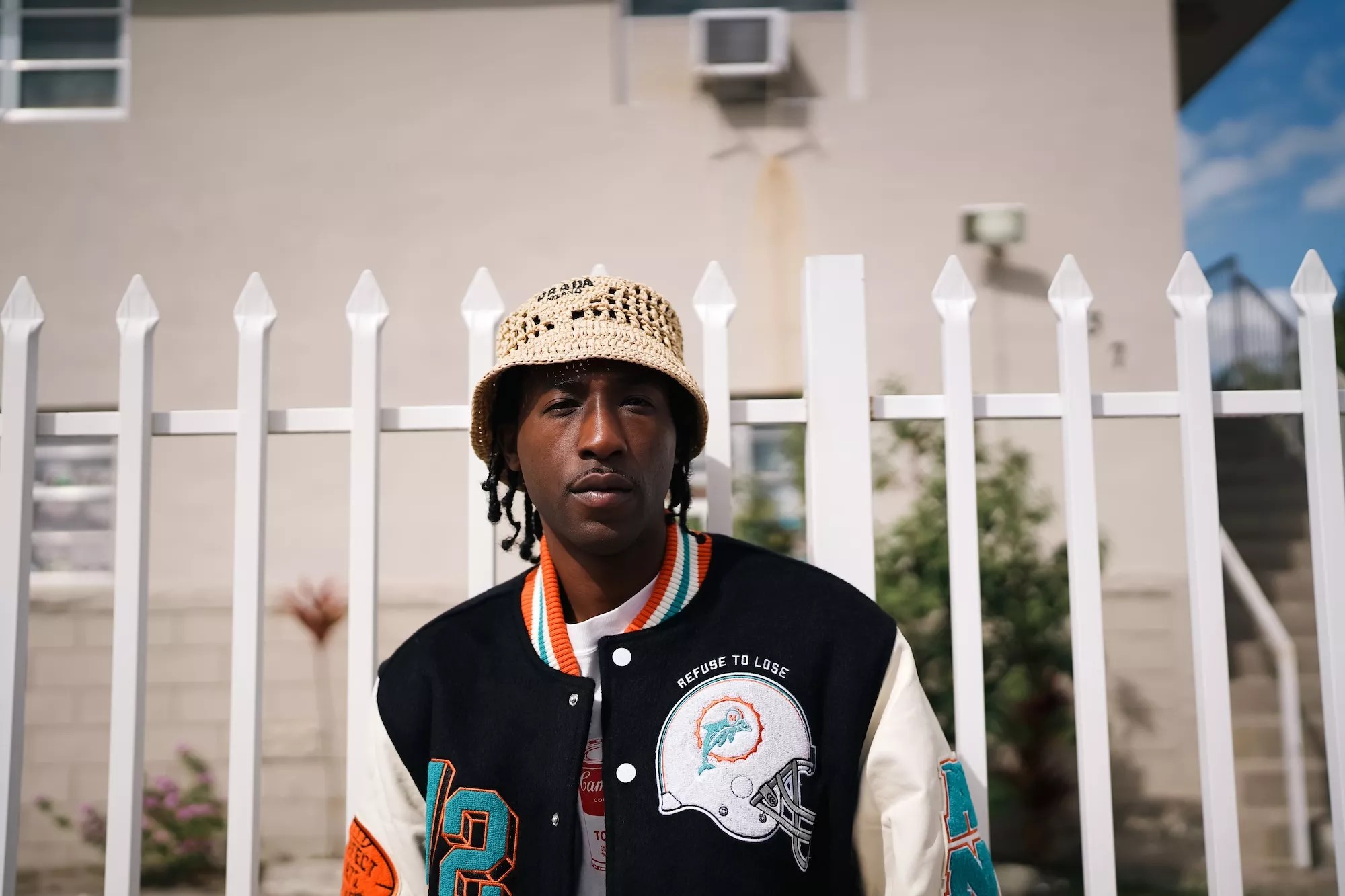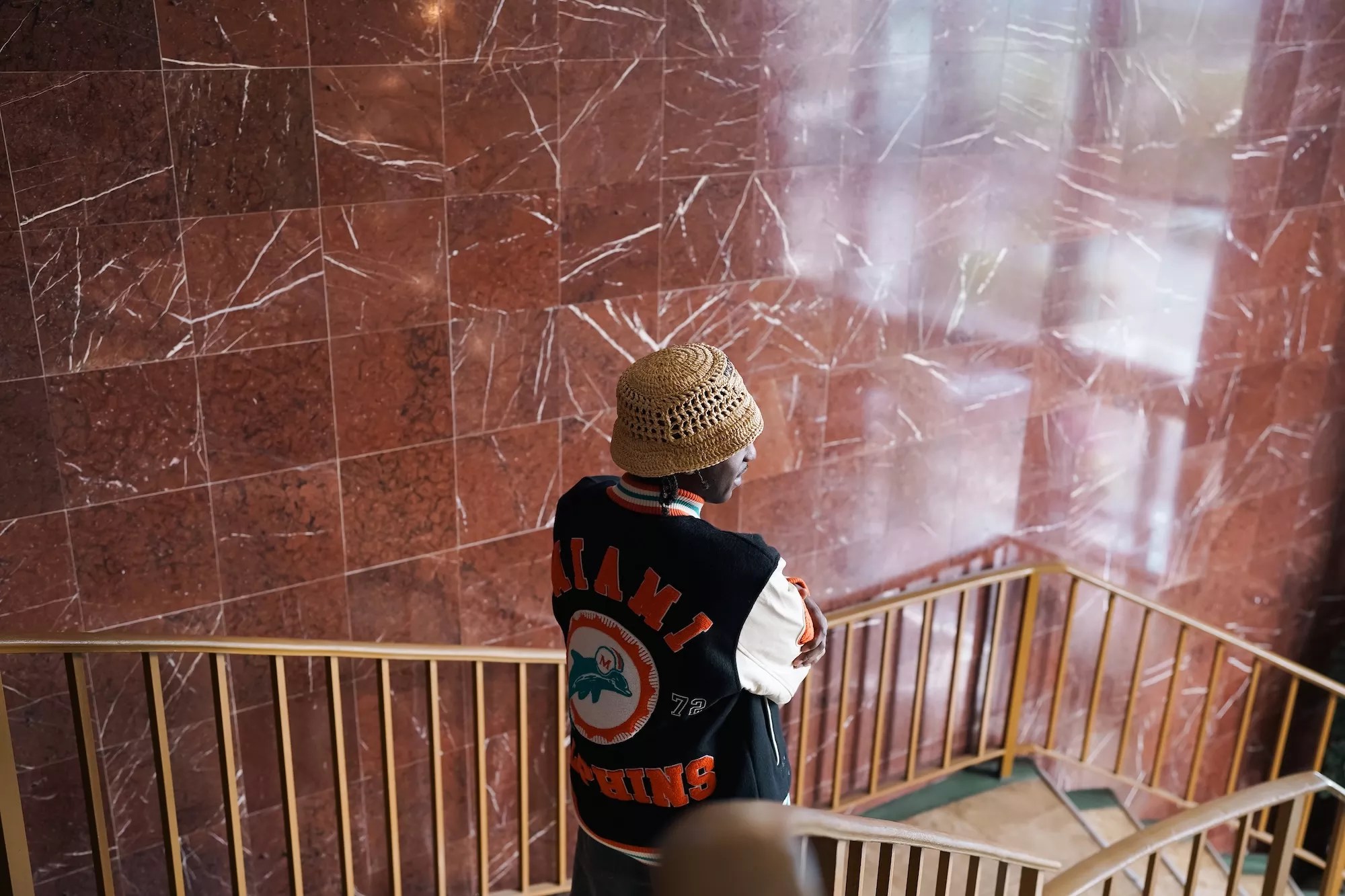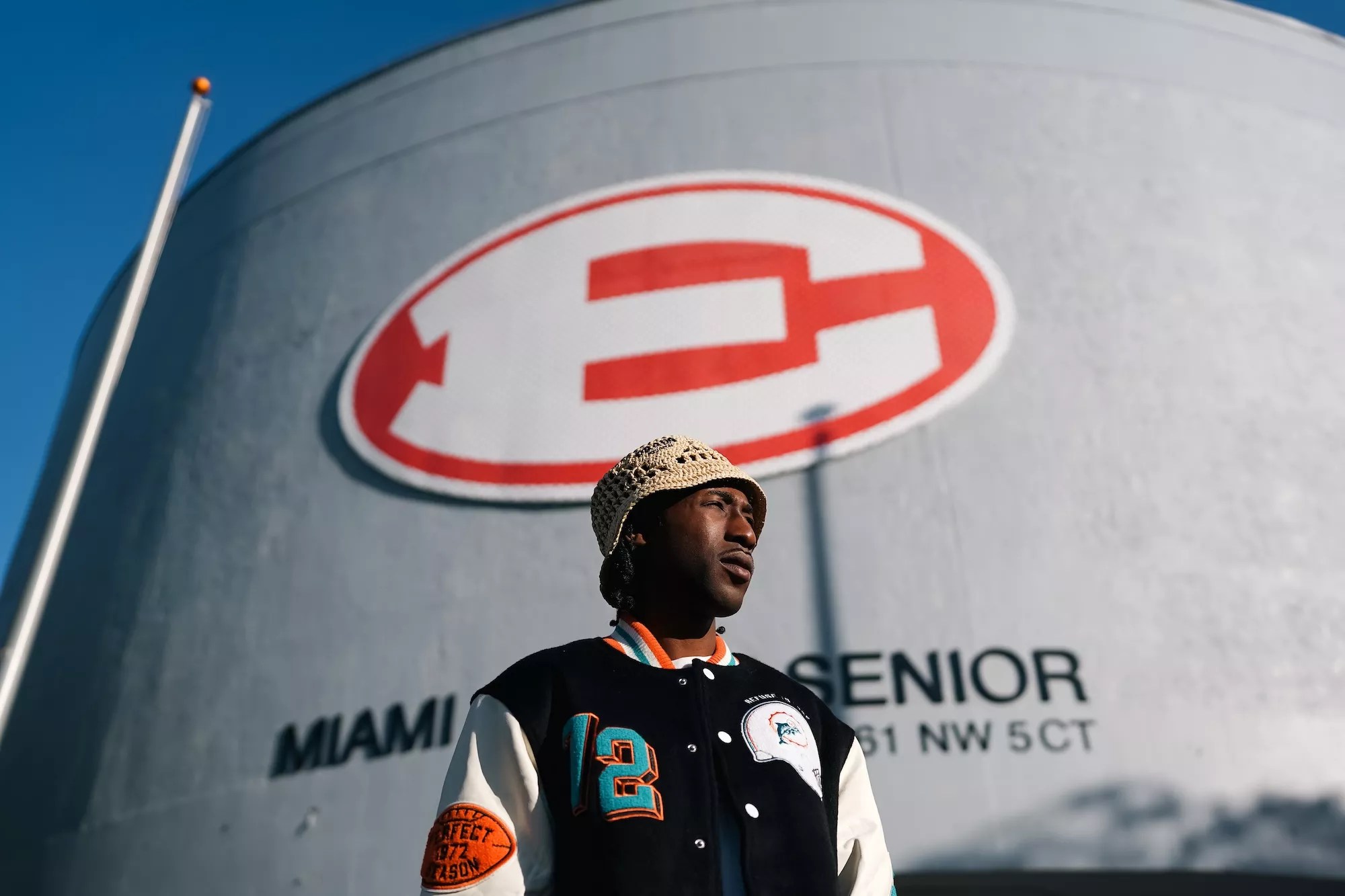
Photo by Gwälä

Audio By Carbonatix
Few rappers rep Miami harder than K. Charles. Who else regularly performs at Rolling Loud, hosts open mic nights, and is establishing a collective dubbed 7Eighty6Forever?
“Seven eight six is significant to me because it’s the Miami area code that’s often overlooked. People always think of 305 when they think of Miami, but 786 is just as much a part of the city’s identity,” Charles tells New Times. “It’s about representing a younger generation and creating something new for the culture. We’re trying to build a platform where everyone, no matter who they are, can showcase their talent.”
At the CollabLab in Little Haiti, Charles is dripped out in the Andrew x Miami Dolphins letterman, black jorts, a twill bucket hat, and slides because he apparently can’t find his Bape Timbs. Soon after, he’s hopping into the car with his homie Cliff, videographer Gwälä, and LoveSK on our way to Charles’ childhood home. Soon, we arrive outside of the small, boxy apartment complex on NE Second Avenue and 54th Street in Little Haiti.
“At first, I didn’t realize how small our apartment was. As a kid, it seemed big,” Charles says. “But as I got older, I saw we were really living in a box. Still, this place means a lot to me. My godmother gave my mom this apartment because she was pregnant with me. She moved downstairs to an efficiency so my mom could raise us here. It’s been years since I’ve been back, but coming here brings back all the memories. Me and my brother used to chill in the living room. It was a one-bedroom apartment for all three of us: me, my mom, and my brother. My godmother gave me my first Walkman here. That’s where my music journey started.”
In Charles’ eyes, Miami has changed a lot in the past few years and is quickly losing its authenticity. Neighborhoods like Brickell and Wynwood nowadays host mainly transplants.
“In a way, it feels like they’re kicking the culture out. Certain areas are being taken over by different groups. Little Haiti is different now. Miami’s going through this weird transformation. The culture is still here, just harder to find.”

“Miami’s always been a melting pot, and that’s what makes it special. But we’ve got to keep pushing to find our identity and grow,” says Charles.
Photo by Gwälä
The conversation begins to shift more into music, with Charles touching on how the Miami sound has changed over the years as well, going from a party sound to a SoundCloud rage sound championed by XXXTentacion and Ski Mask the Slump God to where it is now.
“It’s evolved a lot. Back in the day, it had a down south vibe with artists like Trick Daddy and Uncle Luke. Then, it shifted around 2013 with the punk-rock influence of Raider Klan and others. Now, it’s a mix of everything,” Charles explains. “Miami’s always been a melting pot, and that’s what makes it special. But we’ve got to keep pushing to find our identity and grow.”
He notes that a big factor in making it harder for artists to blow up in Miami is the lack of spaces to throw shows and parties, pointing to the closure of venues like Grand Central and Sidebar.
Thanks to the never-ending traffic northbound on I-95, the car is making its slow crawl to Miami Gardens to visit Starboy Studios, the first studio Charles ever stepped into.
The studio, now located elsewhere in the city, was nestled inside an unassuming low-rise office building across the street from Tootsie’s Cabaret, where Charles once worked as a food runner. Walking through the halls, he sees the site as where his career truly started. It’s also where he met Haze, his go-to music engineer and close friend.
“From the first day we worked together, we clicked, and we’ve never looked back,” he says of his creative partnership with Haze. “It’s been eight, maybe ten years now, and we’ve been locked in, grinding every week. That consistency has been a big part of my career because we were focused on creating the best music possible. Back then, we were really hungry; it was a different kind of energy. Now, we’re still hungry, but we’re more calculated because when you get older, you’ve got more to lose. You can’t afford to waste time or act too wild. But when you’re young, you’re spontaneous, willing to take risks, and ready to dive into anything that feels right.”
Eventually, Charles has the car pull up to Ultrawav Studios, his studio tucked away in an office space on Biscayne Boulevard and NE 151st Street in North Miami. It’s where Charles tends to record a lot of his music, acting almost as a second home for the rapper.
“Haze is family at this point. We’ve been working together for about ten years, and he’s engineered probably 96 percent of my catalog. From the first song we did, it clicked. I was like, ‘This is the guy.’ He has this way of understanding exactly what I want before I even say it. We locked in every week for years, just grinding. That level of consistency is rare, and it’s a big part of why my music sounds the way it does.”

“I know I’d always end up doing music, but I feel like I could’ve learned so much more if I’d stayed focused on education,” says Charles.
Photo by Gwälä
Charles’ first taste of what it was like to make music was at the recording studio at Miami Edison Senior High, where he attended as a student.
“Academically, I wasn’t dumb, but I stopped doing schoolwork after ninth grade. I never did a single piece of homework in my last year of school. I didn’t even bring a book bag – I’d just show up with a notepad and pencil. My mom used to say, ‘Man, you’re gonna do this music thing, and it’s all gonna work out,’ and honestly, it did. But looking back, I wish I had taken school a bit more seriously, maybe even gone to a university to experience that. I know I’d always end up doing music – it’s a God-given talent – but I feel like I could’ve learned so much more if I’d stayed focused on education. Still, everything worked out for me. I can’t complain. But yeah, if I had the chance to do it again, I’d probably go the school route while still chasing my music dreams.”
After all the reminiscing, Charles decides it’s time to grab a bite to eat. On the car ride to Pierre’s Caribbean Cuisine, the Haitian restaurant just off I-95 in Pinewood, he begins to discuss his latest release, Guess Whoo, an EP in collaboration with G-Unit’s DJ Whoo Kid.
“The tape is coming together because I’ve known Whoo Kid for a while now,” he says. “We’re both of Haitian descent, so our shared cultural background really brought us together. But beyond that, the chemistry is just there. He’s a cool dude, very humble, and a real character. We’ve got a big tape coming out for the culture, and I feel like this is something important for Miami history.”
After a quick dinner, it’s back to CollabLab, where Charles and his crew are about to start setting up for another night of freestyles and cyphers.
Before I depart, I ask him about his influences, which range from Kanye West to unexpected names like Billie Eilish and Ed Sheeran.
“I love hip-hop, but I love music as a whole even more,” Charles says. “I make songs that feel refreshing – the kind of music you play on a sunny day at the beach. I aim to give off good vibes and keep things wavy. It’s not just about making hits; it’s about creating something that connects with people on a deeper level. As a musician, you influence people, whether you realize it or not. That’s why I try to put out positive messages. You want your music to uplift and inspire, not bring people down.”